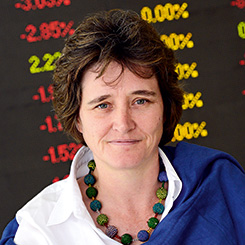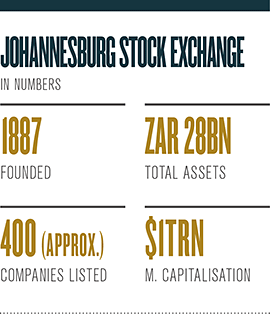
Nicky Newton-King is ambitious for the Johannesburg Stock Exchange (JSE) to become a standard-bearer for its counterparts across Africa. “Companies in some [African] countries have gone to the dollar and euro markets”, she told Africa Business Journal recently. “However, it makes sense to raise debt in Africa for Africa – and the JSE can help to channel the necessary funds to the rest of the continent.”
A regular presence in listings for businesswomen of the year, 48-year-old Newton-King has spent nearly 20 years at the exchange; the last three as CEO.
In that time she has helped to transform the exchange from an almost entirely regional securities platform to a pathfinder for the other 25 exchanges in Africa – an achievement of considerable note. Additionally, last year the JSE was named by the World Economic Forum as the world’s leading securities exchange for the fourth year in a row. And even better, the WEF’s 2013 Global Competitiveness Report ranked South Africa top out of 148 countries for the quality of regulation in its security exchanges, much of which was drafted by Newton-King herself. The exchange is also high in world rankings for the strength of its auditing and reporting standards.
And even better, the WEF’s 2013 Global Competitiveness Report ranked South Africa top out of 148 countries for the quality of regulation in its security exchanges, much of which was drafted by Newton-King herself. The exchange is also high in world rankings for the strength of its auditing and reporting standards.
The first female CEO at the JSE, Newton-King can take much of the credit for the institution’s upturn in fortunes. A lawyer by training, she has had an influential role at the JSE since the 1990s, when she helped to guide the exchange through a challenging process of deregulation with a simultaneous rewrite of all the rules and listing requirements.
But it was when she formally joined the exchange in 1996 that her influence became particularly transformative. As well as negotiating some major transactions, she flew the banner of transparency and straight-dealing in an exchange that, frankly, needed it.
For instance, Newton-King drafted much of the insider trading legislation that provided compensation for investors who had suffered losses as a result of murky practices – a pioneering concept at the time. She also framed the laws that forced the disclosure of beneficial interests in securities. Indeed, her entire career at the JSE has been marked by ever-increasing transparency.
“South Africa’s regulation is clear and concise”, she says with audible satisfaction. “It provides certainty in the market for both issuers and investors.”
A fervent believer in technology, she has also introduced systems for monitoring trading patterns that are among the most advanced in any exchange you might visit. They enable the JSE to verify every single trade, the clients involved and the orders that lead up to the trade.
Newton-King has her eye on the bigger picture. Something of a missionary for the development of exchanges across the continent, she does not rule out an eventual pan-African exchange.
In the meantime, she believes that an effective halfway house is ‘dual listing’, in which debt or equity is listed simultaneously on the JSE and a local exchange in a way that helps companies in other African countries to tap into a much larger pool of capital.
Newton-King’s career shows that transparency pays in the long term. The JSE counts some dozen African companies from outside South Africa on its big board, with more surely to come.

